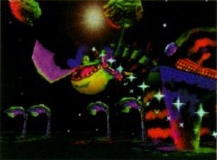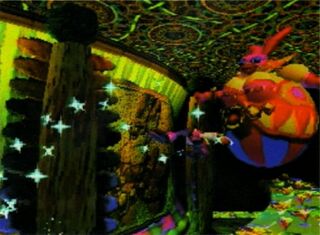NiGHTS into Dreams/Development
From Sega Retro
- Back to: NiGHTS into Dreams.
NiGHTS into Dreams represents both the end of an era at Sonic Team and the start of a new one, being the last Sega project to feature Yuji Naka as the lead programmer and the first to feature Takashi Iizuka as lead designer (replacing Hirokazu Yasuhara, now stationed in North America). The absense of Yasuhara means that the three original founding members of Sonic Team were reduced to two, and with both Naka and Naoto Ohshima rising up the ranks in the years which followed, NiGHTS marks the start of a new generation of Sonic Team developers.
Following the release of Sonic & Knuckles, the key players of Sonic Team spent six months brainstorming on new ideas, with work on NiGHTS beginning around April 1995[1]. Naka began learning about Saturn programming in the Summer of 1994[2].
NiGHTS is a radically different project to the Sonic the Hedgehog games which preceeded it, and was inspired by the works of Carl Jung, and primarily his anima and animus concepts[3]. It is said that Takashi Iizuka invested a significant amount of time researching dreams and the theories that surround them, observing the works of Sigmund Freud and Friedrich Holtz[4], meaning NiGHTS' themes offer a much deeper meaning than at first glance.
Naka and his team chose against developing a Sonic sequel, wishing to take a long break to come up with a more "advanced" game as opposed to falling into the trap of continuous sequels[1]. From an early stage it was decided that the game would be based around replay value, where rather than simply progressing through levels and not looking back, there would be reasons to revisit stages and improve your skills[1].
The visual style NiGHTS into Dreams borrowed from Cirque du Soleil, witnessed by Yuji Naka and others while playing at the Treasure Island Hotel and Casino in Las Vegas[3]. It's oddly typed name was originally put in place to differentiate the NiGHTS character from the word "nights", with the lower-case "i" coming from the gem on the character's chest[3].
NiGHTS was originally set to be a much slower game, but the speed gradually increased over time to make the game more interesting[5]. Naka acknowledged that more could be done with the Saturn[5] (something perhaps proven with Burning Rangers), but likewise it was said that demonstrating graphical and technical prowess was not a priority for the team[6].
While Sonic was seen as a one-dimensional character, NiGHTS had emotions, and was designed to look like an angel to appeal more towards US and European cultures which had proven so successful for Sonic[5]. Notably (and ignored by its sequel), NiGHTS was designed neither to be male or female[7][6][8], but to represent "another you" in the dream world[7]. The character was envisioned as a "hero within your nightmares", having a slightly frightening look but also being cute[6]. NiGHTS is also the colour purple, attempting to challenge an idea that purple was unsuitable in the toy industry[8].
Prior to settling on the "dreams" idea, concepts at Sonic Team included "adventure" and "military" themes, among others[4]. The plan was to contradict the worlds of Sonic the Hedgehog[4].
During testing it was noted that the standard Saturn control pad was not as responsive as the team desired, so work began on a new control scheme in the summer of 1995[9]. Roughly 100 prototype controllers were built and tested[9][10], including remotes[10], foot controllers[10] and even the concept of using a NiGHTS-shaped doll to simulate movements[9]. The 3D Control Pad was developed simultaneously over the course of six months[9] to ensure the game was more smooth and comfortable to play[5].
According to Sonic Team, major parts of the code were re-written between five and ten times[9]. Very little is used from Sega AM2's Sega Graphics Library, with most of the technology being created by Sonic Team[2].
Voice samples were recorded in-house by various developers, usually in the middle of the night as Sonic Team's studios were not sound-proofed[3].
The game was first demonstrated in Japan at the '96 Tokyo Toy Show[11]. The trailer from this event is available as an unlockable in Christmas NiGHTS.
As one of the top Sega employees in his field, Yuji Naka's engine for NiGHTS is often considered to be one of the most ambitious programming projects on the Saturn, at one point being recycled for Sonic X-treme (much to his distaste). Much of the game was built with unique input methods in mind (such as odd flight sticks), inevitably evolving into Saturn's the 3D Control Pad. At one point in development, the team was visited by Steven Spielberg, who played the game on an experimental controller, later dubbed internally as the "Spielberg Controller". Unique controllers would be explored again in the development of Air NiGHTS, a cancelled Sega Dreamcast sequel.
Sonic Team were for a long time interested in a PC version[9], and Naka has stated that he created a conversion of NiGHTS shortly after the Saturn game's release. In an interview he assumed it had been released[3], however PC users did not receive a port of the game until 2012, when a version was released for Steam.
Yuji Naka has stated that he does not believe in making sequels to NiGHTS, comparing it to Spielberg's E.T. the Extra-Terrestrial[3]. After NiGHTS, Naka would assume management roles as producer and head of Sonic Team, before leaving to found Prope in 2006, only for NiGHTS: Journey of Dreams to be released one year later.
Initial screenshots
When announcing the game, Sega released four screenshots of NiGHTS into Dreams[12]. Neither of these screenshots have a heads-up display.
References
- ↑ 1.0 1.1 1.2 Edge, "August 1996" (UK; 1996-07-12), page 38
- ↑ 2.0 2.1 Next Generation, "July 1996" (US; 1996-06-18), page 47
- ↑ 3.0 3.1 3.2 3.3 3.4 3.5 Interview: Yuji Naka (2010-07-05) by NightsIntoDreams.Com
- ↑ 4.0 4.1 4.2 Computer & Video Games, "July 1996" (UK; 1996-06-12), page 24
- ↑ 5.0 5.1 5.2 5.3 Edge, "August 1996" (UK; 1996-07-12), page 39
- ↑ 6.0 6.1 6.2 Sega Saturn Magazine, "September 1996" (UK; 1996-08-20), page 40
- ↑ 7.0 7.1 Sega Saturn Magazine, "September 1996" (UK; 1996-08-20), page 38
- ↑ 8.0 8.1 Computer & Video Games, "July 1996" (UK; 1996-06-12), page 23
- ↑ 9.0 9.1 9.2 9.3 9.4 9.5 Sega Saturn Magazine, "September 1996" (UK; 1996-08-20), page 41
- ↑ 10.0 10.1 10.2 Computer & Video Games, "July 1996" (UK; 1996-06-12), page 25
- ↑ Sega Saturn Magazine, "January 1997" (UK; 1996-12-17), page 56
- ↑ Maximum, "April 1996" (UK; 1996-04-27), page 110
| NiGHTS into Dreams | |
|---|---|
|
Main page | Comparisons | Achievements | Downloadable content | Credits | Hidden content | Bugs | Development | Magazine articles | Video coverage | Reception | Promotional material | Merchandise
Music: NiGHTS Theme Song: Dreams Dreams (1996) | NiGHTS Original Soundtrack (1996) | A NiGHTS Remix: Another Dreams (1997) | NiGHTS into Dreams: Perfect Album (2008) | NiGHTS into Dreams (2024) Videos: Sega Official Video Library Vol. 6: NiGHTS into Dreams (1996)
Prototypes: 1996-05-14
| |




